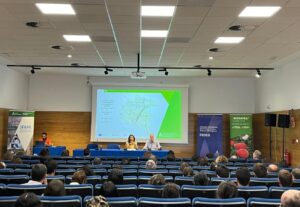- RedSayra and Red Samantha are the Planasa genetics which have formed part of the research carried out by the Andalusian Institute for Agricultural, Fisheries, Food and Organic Production Research and Training (IFAPA).
- The results were presented at the ‘IFAPA Technical Seminar: Presentation of strawberry variety trial results – 23/24 season’.

Planasa’s strawberry varieties RedSayra and Red Samantha have stood out in the trials carried out by the Andalusian Institute for Agricultural, Fisheries, Food and Organic Production Research and Training (Ifapa) during the 2023-2024 season. The results were presented at the ‘IFAPA technical conference: Presentation of strawberry variety trial results – 23/24 season’, held in the Agroexperimental Business Centre of the Huelva Provincial Council in Trigueros. More than 130 professionals from the sector attended to this event in which the IFAPA presented the report detailing the results obtained from trials with 15 strawberry varieties belonging to a total of 10 breeding programmes, including Planasa.
Among the most relevant aspects, the hardiness of both varieties was highlighted, which showed the lowest percentage of mortality among the fifteen varieties analysed. Specifically, RedSayra showed less than 1% of dead plants, while Red Samantha remained below 2%.
In terms of earliness, RedSayra was also positioned as one of the earliest varieties on the market in all production modalities, so the trial reconfirmed the main trait with which this genetics, that has been present in the main European retailers, is marketed.
In addition, RedSayra was noted for its performance in various cultivation systems, including conventional, soilless, non-disinfected and organic. In conventional cultivation, at the end of February, RedSayra reached a yield of 25,000 kg/ha, which is over 415 gr/plant, thus outperforming all other varieties. In soilless cultivation, RedSayra achieved an excellent yield of 26,000 kg/ha. In soilless and organic conditions, it also showed a remarkable yield of 19,000 kg/ha and 14,000 kg/ha respectively.
Another significant aspect of the trials was the low irrigation requirement of RedSayra compared to the other varieties evaluated. In particular, it showed a water consumption 9% below average, with a total of 3,336 m³. This aspect is particularly relevant given Planasa’s commitment to the development of sustainable and environmentally friendly varieties, specifically those that require less water resources. This is even more important if we also consider the water shortages suffered by the sector during the last few seasons.
The conference not only provided a detailed overview of the yield and characteristics of the new strawberry varieties, but also reinforced the importance of innovation and sustainability in modern agriculture. The research and results presented by Ifapa underline the continuous effort to improve the efficiency and sustainability of strawberry cultivation, benefiting both farmers and the environment.






